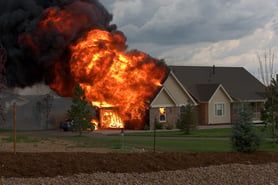 Whether we're ready for it or not, winter weather is upon us. And with colder temps comes an obvious increase in the use of fireplaces. For many of us, our fireplaces/chimneys haven't been touched in months. However, chimneys account for 75% of home heating fires - meaning homeowners should actively maintain and follow the necessary upkeep.
Whether we're ready for it or not, winter weather is upon us. And with colder temps comes an obvious increase in the use of fireplaces. For many of us, our fireplaces/chimneys haven't been touched in months. However, chimneys account for 75% of home heating fires - meaning homeowners should actively maintain and follow the necessary upkeep.
Property Casualty 360 provides the following tips to prevent chimney fires in your home.
- Have your chimney inspected and cleaned at least once a year by a professional, and more than that if creosote builds up on the chimney walls more rapidly.
- Consider installing a stainless steel liner that will withstand even the highest temperatures and will keep the embers contained.
- Watch out for soot buildup. Soot is softer than creosote, but is also flammable and should be cleaned up regularly.
- Between the professional inspections / cleanings, be sure to check and monitor your wood-burning fireplace for signs of buildup or other problems.
- Clean the interior of your fireplace, including the floor, regularly. Sweep or vacuum up cold ashes.
- Your chimney has a cap on the top of it with open sides (usually covered in mesh to keep rain, birds, squirrels, and debris out). Make sure this cap is regularly inspected and replaced when necessary.
- Check the interior of your fireplace for creosote buildup. It is flammable, therefore too much buildup is a fire hazard and should be cleaned away with a creosote remover as soon as possible.
- Anytime there is smoke indoors from your fireplace, troubleshoot and immediately correct any problems you find. Possible causes are a dirty chimney, soot or creosote buildup, other debris, a sample that isn't open or fully opened, or wood not building completely.
- To improve your fireplace's efficiency, you should also consider installing heat-proof glass doors to protect against heat loss and a fan or blower to direct heat into the room.
- If possible, burn hardwoods like oak, maple, ash, and birch. These woods burn hot and long, are cleaner to handle, and have less pitched sap. They also tend to leave less creosote buildup but can be more expensive.
Looking for additional safety tips for your home? Contact a KnowledgeBroker at R&R Insurance.

